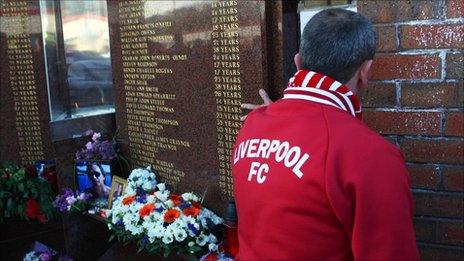Hillsborough: The Thatcher papers
- Published
- comments
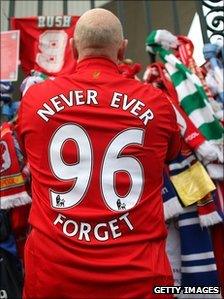
The 1989 disaster claimed the lives of 96 Liverpool fans
Cabinet Office papers from 1989 seen by the BBC show how Margaret Thatcher's government was misinformed about the cause of the Hillsborough disaster - and illustrate why the Information Commissioner demanded the disclosure of these secret documents.
Last July the commissioner ruled, external that it was in the public interest for documents about the Hillsborough tragedy to be released, since it would "add to the public knowledge and understanding about the reaction of various parties to that event, including the government of the day".
This followed a freedom of information request from the BBC that had been rejected by the Cabinet Office. That FOI case was dropped after a government pledge to publish its files on Hillsborough via an independent panel, external later this year.
The BBC has seen now some of this material and on Thursday is reporting details from these documents.
Due to these disclosures, we now know that a few days after the tragedy in April 1989 Margaret Thatcher was informed about the views of senior officers from Merseyside Police. She was told that one of them blamed drunken Liverpool supporters for the terrible incident which led to the deaths of 96 of the club's fans as a result of horrific overcrowding.
The briefing she received also reported the assessment of the then Merseyside Chief Constable Sir Kenneth Oxford. He thought that a key factor was the presence of Liverpool fans without tickets and this was being ignored while the authorities were being blamed.
Blame game
Sir Kenneth was a controversial chief constable who had often clashed with local politicians over his tough policing strategy, and was at this point close to retirement.
We already knew that private briefings accusing the Liverpool fans had been coming from South Yorkshire Police - this was the force responsible for the Hillsborough ground in Sheffield. It was later criticised for the poor crowd control that had actually been the main factor in causing the loss of life.
Lady Thatcher's then press secretary Sir Bernard Ingham has already revealed that when he accompanied her on a visit to the stadium the day after the tragedy, they were told the incident was the fault of a "tanked-up mob" of Liverpool supporters.
What we now know is that a similar message was coming to her, not only from the force which had made catastrophic errors in policing the FA Cup semi-final, but also from the top ranks of the police force covering the locality of most of the victims - the bereaved families and the anguished survivors.
Of course this document only reveals what was said in the period soon afterwards, and those involved may have changed their minds as further evidence came to light.
But it is interesting to note that the position of the senior Merseyside officers conflicted with that taken at the same time by some junior ranks in the same force.
In newspaper reports, external at the time, the Merseyside Police Federation was quoted as saying that the accusations against Liverpool fans were "ill-informed comments" which were "based on hearsay rather than evidence". The local federation secretary said that his phone had been "red hot" with calls from Merseyside officers demanding he speak out to "redress the balance".
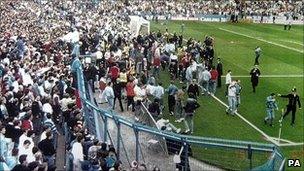
The victims of the tragedy at Sheffield's Hillsborough stadium were crushed in over-crowded pens
In due course it was the view of the federation, rather than the chief constable, which was found to be correct by the official inquiry into the disaster by Lord Justice Taylor. He attributed the main cause of the incident to police failures in crowd control that led to a fatal crush in the Liverpool fans' section of the ground.
The BBC's report today also contains another interesting revelation: that there was unease within the government about what a senior Downing Street official considered to be Lord Taylor's "distinctly unhelpful" response to an approach to align his inquiry schedule with the government's political timetable.
In the wake of Hillsborough, Margaret Thatcher's policy priority was to press ahead with introducing a compulsory identity card scheme for football supporters. The government had already been planning this to tackle the hooliganism that badly affected the game in the 1980s (although the idea was never eventually implemented).
The Home Secretary Douglas Hurd met Lord Justice Taylor soon after the judge was appointed to carry out the inquiry. Lord Hurd tried to persuade him to consider the membership scheme in time to fit in with the government's schedule for pushing forward with it. The judge couldn't guarantee this, insisting his timings would be determined by the process of establishing the facts of what happened.
ID cards
The current government has promised that official records relating to the disaster will be released through the Hillsborough Independent Panel. This was set up in December 2009, external by Labour to work towards publishing these files, although cabinet papers were initially excluded from its terms of reference.
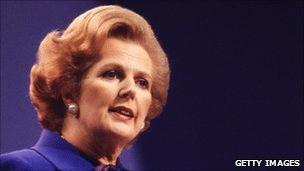
Margaret Thatcher was prime minister at the time
The panel has said it will complete its work by the end of June, although there are reports today, external that this deadline will be postponed. It is expected to release a very large quantity of documentation. The papers being covered today by the BBC are only a small proportion of the undisclosed material.
Today's revelations do not constitute a "smoking gun" or lend support to any kind of conspiracy theory, but they have added valuably to the state of public knowledge about the political reaction to the terrible events at Hillsborough in April 1989.
In brief, we have learnt that the top ranks of Merseyside Police helped to misinform Margaret Thatcher by wrongly blaming Liverpool fans. And we have learnt that there was dissatisfaction within the government at Lord Justice Taylor's refusal to adapt his inquiry to their political timetable for pressing ahead with an identity card scheme for football fans.
- Published15 March 2012
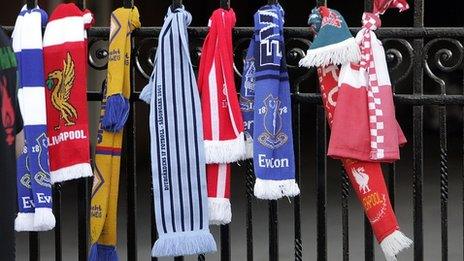
- Published17 October 2011
